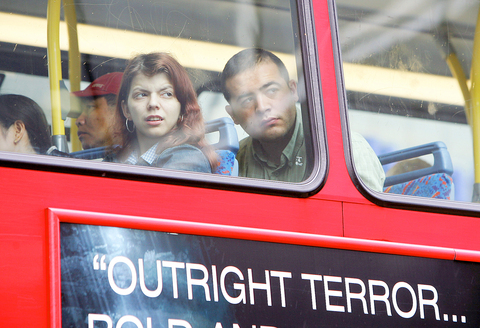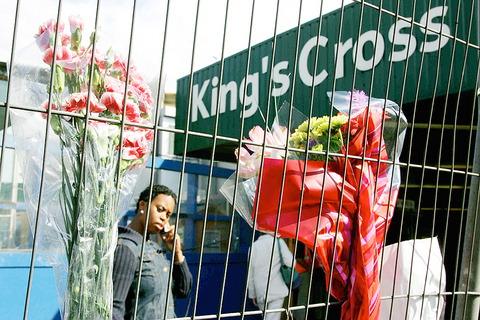Commuters in London reluctantly descended into the Underground yesterday morning, while police scrambled through dangerous rail tunnels deep underground yesterday to hunt for clues and retrieve bodies after suspected al-Qaeda bombers killed more than 50 people in London rush-hour blasts.
A day after four bombs tore through three underground trains and a red double-decker bus, commuters headed to work again on London's battered transport network, some fearful, some defiant, undeterred by the knowledge it might happen again.
"My granddad called me last night and told me I had to go to work today," said Sally Higson, 36. "He's 89. He lived through the war and said it was important to carry on as normal."

PHOTO: AFP
"I was scared, but what can you do?" said Raj Varatharaj, 32, emerging from a subway station. "This is the fastest way for me to get to work. You just have to carry on."
Ten of London's 12 subway lines reopened yesterday, though service on three was restricted. Bus service was running through central London, except for diversions around blast sites.
Thursday's attacks -- which ministers said bore the hallmarks of the Islamic militant al-Qaeda network -- were London's deadliest in peacetime.

PHOTO: AFP
Sir Ian Blair, commissioner of the Metropolitan Police, said more than 50 people were killed in the blasts and 700 wounded.
He said the final death toll was not yet known. Police had yet to reach one of the bombed underground carriages in central London as the surrounding tunnel was unsafe, but Blair said no survivors were trapped underground and the task now was to retrieve bodies.
Andy Trotter of the British Transport Police said the number of bodies still trapped was not known, but one police source said it could be more than 10.
"This was a crowded tube train at rush hour in central London with several hundred people on board," Trotter said.
Andy Hayman, of the London police specialist operations branch, spoke of the "extreme circumstances" under which rescuers were working, saying they faced the hazards of tunnel collapse, vermin and "dangerous substances" in the air.
"I think we can all respect the sort of things our people are actually confronting," he said.
A maintenance worker, who did not want to be identified, said he had reached the site early yesterday and described "awful" scenes, with several bodies in the carriage.
"We got up to the carriage, although it was very dark there at the time," he said. "The smell was awful."
Hayman said the bombs were believed to have contained up to 4.5kg of explosives and could have been carried onto the trains and bus in backpacks.
Police denied that they had found any unexploded devices. On Thursday, a senior US counterterrorism official who spoke on condition of anonymity because of the sensitivity of the information had said British authorities identified suspicious packages and detonated them in controlled explosions.
Police said they had no specific intelligence warning of the attacks. Home Secretary Charles Clarke said the blasts "came completely out of the blue."
The New York Times reported yesterday that timing devices rather than suicide bombers set off the explosions.
Clarke told BBC radio that investigators were examining a statement from the "Secret Group of al-Qaeda's Jihad in Europe."
The e-mail statement by the previously unknown group said: "Our mujahideen have carried out a blessed invasion in London and here is Britain now burning with fear and terror ... We have repeatedly warned Britain and have kept our promise."
""We monitor now very intensively a wide range of Web sites ... Their claim is something we certainly take seriously," Clarke said.
An Internet statement from another group, calling itself the "Organization of al-Qaeda - Jihad in the Arabian Peninsula" praised the attacks and said Rome would be targeted next.
Queen Elizabeth II and her son Prince Charles visited bombing victims at the crowded St. Mary's Hospital yesterday.
"It's been one of the things that many of us have dreaded for a long time," Charles said, speaking to patients injured in the blasts.
"What I can never get over is the resilience of the British people who have set us all a fantastic example of how to recover," he said.
Also see stories:
Premier urges calm after terror attacks in London

ENDEAVOR MANTA: The ship is programmed to automatically return to its designated home port and would self-destruct if seized by another party The Endeavor Manta, Taiwan’s first military-specification uncrewed surface vehicle (USV) tailor-made to operate in the Taiwan Strait in a bid to bolster the nation’s asymmetric combat capabilities made its first appearance at Kaohsiung’s Singda Harbor yesterday. Taking inspiration from Ukraine’s navy, which is using USVs to force Russia’s Black Sea fleet to take shelter within its own ports, CSBC Taiwan (台灣國際造船) established a research and development unit on USVs last year, CSBC chairman Huang Cheng-hung (黃正弘) said. With the exception of the satellite guidance system and the outboard motors — which were purchased from foreign companies that were not affiliated with Chinese-funded

PERMIT REVOKED: The influencer at a news conference said the National Immigration Agency was infringing on human rights and persecuting Chinese spouses Chinese influencer “Yaya in Taiwan” (亞亞在台灣) yesterday evening voluntarily left Taiwan, despite saying yesterday morning that she had “no intention” of leaving after her residence permit was revoked over her comments on Taiwan being “unified” with China by military force. The Ministry of the Interior yesterday had said that it could forcibly deport the influencer at midnight, but was considering taking a more flexible approach and beginning procedures this morning. The influencer, whose given name is Liu Zhenya (劉振亞), departed on a 8:45pm flight from Taipei International Airport (Songshan airport) to Fuzhou, China. Liu held a news conference at the airport at 7pm,

GRIDLOCK: The National Fire Agency’s Special Search and Rescue team is on standby to travel to the countries to help out with the rescue effort A powerful earthquake rocked Myanmar and neighboring Thailand yesterday, killing at least three people in Bangkok and burying dozens when a high-rise building under construction collapsed. Footage shared on social media from Myanmar’s second-largest city showed widespread destruction, raising fears that many were trapped under the rubble or killed. The magnitude 7.7 earthquake, with an epicenter near Mandalay in Myanmar, struck at midday and was followed by a strong magnitude 6.4 aftershock. The extent of death, injury and destruction — especially in Myanmar, which is embroiled in a civil war and where information is tightly controlled at the best of times —

Taiwan was ranked the fourth-safest country in the world with a score of 82.9, trailing only Andorra, the United Arab Emirates and Qatar in Numbeo’s Safety Index by Country report. Taiwan’s score improved by 0.1 points compared with last year’s mid-year report, which had Taiwan fourth with a score of 82.8. However, both scores were lower than in last year’s first review, when Taiwan scored 83.3, and are a long way from when Taiwan was named the second-safest country in the world in 2021, scoring 84.8. Taiwan ranked higher than Singapore in ninth with a score of 77.4 and Japan in 10th with